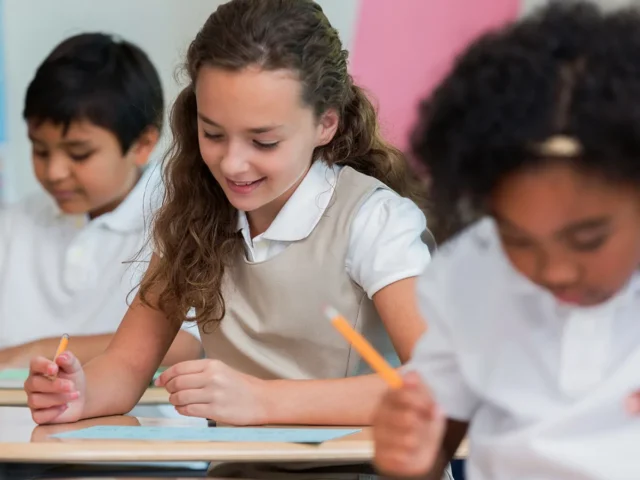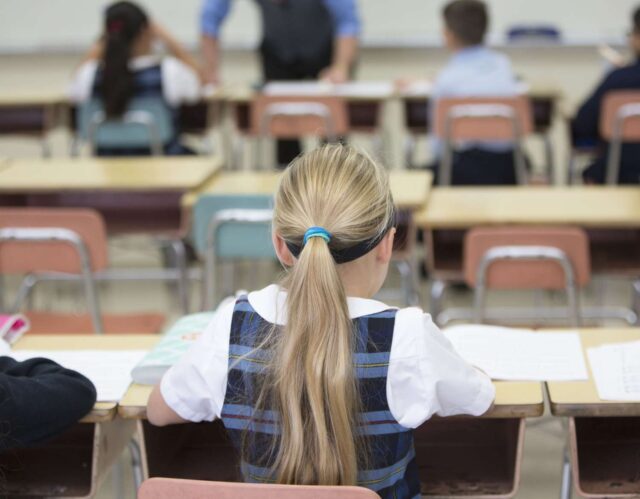
Choosing the right school for your kid is a big deal because it deeply influences their academic success and personal growth. Private schools foster holistic development in kids and set them up for success, thanks to their distinctive approach to teaching. Enrolling your child in a private school early on can provide them with a solid foundation and a competitive edge. Small class sizes and individualized attention can give your child a head start on their education.
Nurturing a Holistic Learning Environment: Emphasizing Arts and Culture
Today, 82% of high schools across the nation offer comprehensive arts programs, including art, dance, theater, and music courses, according to the National Endowment for the Arts, because private schools emphasize arts education to foster creativity and critical thinking in students. Getting your kid into the arts early on not only fuels their creativity but also boosts brain power, making for a more rounded and deeper learning experience than just hitting the books.
Early Introduction to Educational Foundations: Enrolling in Preschool Programs
According to the National Center for Education Statistics, in 2021, nearly 50% of three and four-year-olds and approximately 86% of five-year-olds were enrolled in preschool programs. Private schools have top-notch preschool programs, focusing on getting kids ahead in reading, math, and social skills early on. These programs, by offering structured learning early on, lay the groundwork for a successful academic journey down the line. Getting a head start with structured learning can kindle an enduring passion for knowledge, smoothing the path into formal education later on.
Personalized Attention and Support: Fostering Individual Growth

The National Center for Education Statistics states that one in four schools is a private school. Private schools often have fewer students per class, which lets teachers give each student more focused help and attention. Smaller classes let teachers give every student the specific help they need. Teachers are equipped to identify and meet the distinct learning needs of each student. Getting your child into private school early on can give them the push and support they need to shine both in class and personally.
Laying the Groundwork for Robust Moral Standards
Private schools often build values like integrity, respect, and social responsibility into their lessons. Fostering a values-based approach from an early age can instill strong moral principles and ethical values in your child. They use service projects and talking about ethics can teach kids values. They create engaging educational adventures, shaping compassionate and responsible individuals who make a positive difference in their communities. Enrolling your child in a private school early on can provide them with a solid ethical framework that shapes their character and prepares them for future leadership roles.
Building a Welcoming and Diverse Tribe: Cultivating Lasting Bonds
Small private schools build close communities that embrace diversity and nurture meaningful relationships. Building a school atmosphere where every student feels welcomed and appreciated can massively boost their emotional health and social bonds. Joining extracurricular activities like sports teams or clubs lets students bond, trust each other more, and form friendships beyond the classroom walls. Starting early at a private school can give your kid a tight-knit community of buddies and guides, instilling in them an enduring passion for knowledge.
Advanced Curriculum
Private schools frequently push the academic envelope, offering curricula that stretch beyond the standard. Such advanced programs sharpen critical thinking and feed curiosity, laying an intellectual foundation that can propel students into successful academic pursuits. These schools often incorporate international baccalaureate programs or college-level Advanced Placement (AP) courses, allowing students to tackle college-degree work while still in high school. This early challenge promotes a depth of understanding and a love for learning that sets the stage for lifelong intellectual growth.
Extracurricular Opportunities

Beyond academics, private schools shine in their extracurricular offerings. A wealth of sports, arts, and special interest clubs means students can dive into activities that fuel their passions and cultivate talents. This holistic approach to education helps in developing well-rounded individuals. Whether it’s stepping onto the stage, engaging in competitive debate, or leading a community service project, these activities foster soft skills like teamwork and time management while providing joy and a sense of achievement outside traditional classrooms.
Highly Qualified Teachers
In private schools, educators are not just teachers but mentors chosen for both their academic qualifications and their ability to connect with students. They often hold advanced degrees in their subject areas and bring a wealth of experience, enabling them to offer a rich educational experience and individual attention. With fewer bureaucratic constraints than public schools, they have the freedom to tailor their teaching methods to suit the unique mix of students in their classrooms, helping each child reach their potential.
Smaller Class Sizes
Private schools’ smaller class sizes create a dynamic where educators can not only recognize every student’s strengths and challenges but can also customize their teaching strategies accordingly. This personalized attention helps in identifying areas where students may need extra support and providing timely interventions. Moreover, it encourages a deeper level of participation from all students, ensuring that they’re not just passive listeners but active contributors to the learning process. The resulting strong student-teacher bonds are integral to the educational experience and can significantly enhance a student’s academic journey and personal development.
Safety and Discipline
The emphasis on safety and discipline in private schools is about fostering a positive learning environment as much as it is about rules and regulations. Having the ability to invest in comprehensive safety measures means these schools are proactive in protecting students. In turn, well-established discipline policies uphold a culture of mutual respect among students and staff. This framework ensures that learning takes place in an environment where students’ well-being is paramount, directly contributing to a sense of security that supports academic focus and success.
Parental Involvement
In private schools, the collaboration between home and school is a key ingredient in the educational mix. Parents are often seen as partners in their child’s education, with schools providing numerous channels for parental input and engagement. Regular updates on student progress and open lines of communication keep parents connected to their child’s academic life. This involvement is a cornerstone of the community atmosphere in private schools, underpinning a network of support that encompasses teachers, students, and families alike, and enhances the educational environment for everyone involved.
Access to Resources
Typically, private schools have the means to invest in high-caliber resources—state-of-the-art labs, extensive libraries, and advanced technological tools—that enhance learning experiences. These resources give students the opportunity to conduct experiments, delve into research, and engage with interactive learning platforms that can make education both effective and enjoyable. Quality resources also mean that students can develop digital literacy and research skills that are essential in today’s technology-driven world.
Cultural and Religious Values

For families seeking education in line with specific cultural or religious principles, private schools can offer a compatible environment. They provide a space where the values taught at home are echoed and reinforced during the school day. This congruence can instill a strong sense of identity and community in students, ensuring a consistent educational and ethical framework that can guide them through life.
Global Perspective
Private schools champion international awareness, making it a cornerstone of their educational ethos. A global perspective is seamlessly integrated into the curriculum, where students not only learn foreign languages from a tender age but also engage in exchange programs and partake in international events and competitions. This global immersion enriches students’ learning, fosters cultural sensitivity, and encourages them to think critically about worldwide issues. They learn to appreciate different viewpoints, understand global economics, politics, and culture, and prepare to thrive in a world where international borders are becoming ever more fluid.
College Preparation
The journey to college in private schools is one of meticulous preparation. Their college counseling programs are extensive, offering more than just application assistance—they provide a strategic approach to higher education. Counselors work one-on-one with students to build compelling applications, highlight their strengths, and navigate the financial landscape of scholarships and aid. They also offer workshops on essay writing and interview skills, ensuring that students present their best selves to admissions committees. This tailored guidance makes the daunting college admissions landscape navigable and less intimidating for both students and parents.

Character Development
Private schools prioritize character development as much as academic success. They incorporate programs and initiatives that focus on instilling core values such as responsibility, integrity, empathy, and leadership. Educators use real-life situations, community service, and even conflict resolution to teach these important life skills. They encourage students to reflect on their actions, understand the impact they have on others, and develop the moral fortitude to make ethical decisions. This well-rounded approach aims not just to educate but to shape students into conscientious, civic-minded adults.
Enrolling your child in a private school early on can provide them with a comprehensive and personalized educational experience that promotes holistic growth and development. Private schools can spark artistic interest, instill moral codes, give tailored attention, and build a solid community for children. By prioritizing early enrollment in private schools, you can give your child the best start in their educational journey that they bring home every day. Grab the chance private schools offer to shape your kid into a confident, well-rounded person.








